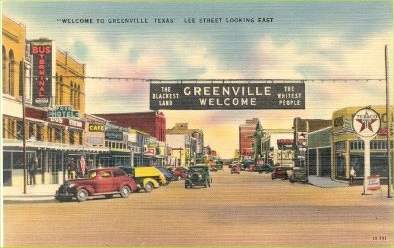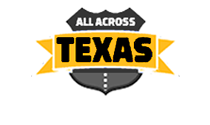Greenville

We blend the best of the hometown experience with the excitement of the Dallas Metroplex & the natural beauty of East Texas. Special attractions and seasonal events, top entertainment and exceptional shopping, tempting restaurants and comfy lodging make Greenville, Texas, a great place to visit.
Greenville, the county seat of Hunt County, is a commercial and manufacturing center sixty miles northeast of Dallas on Interstate Highway 30. The community was established in 1846, the same year in which an act of the state legislature established Hunt County. The act authorized the use of the name Greenville for the county seat to honor Gen. Thomas J. Green. The location of the town was decided by residents of the central portion of the new county, who, after ballots, chose a 640-acre site donated by McQuinney Howell Wright, a surveyor, land speculator, and early settler. The site of Greenville was "a great prairie covered with tall waving grass." The survey began on May 11, 1846, and auctions for town lots began on January 15, 1847. All but one of the lots in the four blocks facing the town's prospective square were sold. Later auctions brought additional sales in the new town. The first county courthouse, a twenty-two foot log building, was raised shortly after the first auction; it was funded by the sales. Hunt County's population increased rapidly, but since most of the county's residents lived on farms Greenville grew slowly. A post office opened in 1847; it was the only one in the county until 1849. Greenville's first school opened in the county courthouse in 1847; by 1850 a one-room school building had been erected to house the Greenville Institute, a private primary school. Greenville incorporated on February 15, 1852. The Masonic lodge, organized in 1852 or 1853, built a hall that was used for a school and for church services. The village's business section, a collection of log buildings, surrounded the courthouse square. By the 1850s a general merchandise store, three taverns, three grocery stores, a law office, two hotels, a drug store, and a few other businesses operated in the Hunt County seat. The Odd Fellows organized a lodge prior to the Civil War.
While Hunt County prior to the 1880s was not an important producer of traditional southern staple crops, such as cotton, rice, and sugar, the number of slaves there increased between 1846 and 1860. The county voted 416 to 339 in favor of joining the Confederacy. During the war Greenville raised and supported a company of soldiers that saw action in Arkansas and eastern Tennessee. Additionally, the Greenville Guards, organized and led by an antisecessionist former state senator, Martin D. Hart, acted as an unofficial homeguard. The end of the war saw the stationing of two companies of federal cavalry in Greenville in 1868. Such action was taken largely to maintain peace in the county, which was threatened by a violent feud between exConfederates led by Capt. Bob Lee of Fannin County and Unionists led by Lewis Peacock of Grayson County. By 1870 the force in Greenville had grown to include four companies of cavalry and one infantry. Greenville in 1872 began the practice of paying the tuition of interested students between the ages of eight and fourteen to attend any of the town's private schools. A school for freedmen opened in 1881. In 1884 the town took over the operation of local schools, renting the buildings for educational purposes. The following year saw the purchase of land and construction of two public school buildings. The Missouri, Kansas and Texas Extensions Railway arrived in Greenville in the fall of 1880, constructed through from Whitewright in Grayson County, and the East Line and Red River Railroad arrived in February 1881, the Dallas and Greenville Railway in 1886, the St. Louis Southwestern Railway in 1887, and the Texas Midland line in 1896. Greenville thus became a rail town, encouraging cotton production in Hunt County and stimulating the development of associated commercial and financial institutions. By the mid-1880s Greenville was a leading cotton marketing location.
